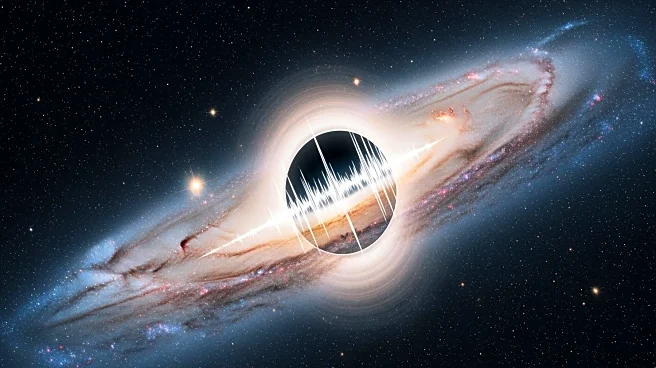What's Happening?
Astronomers have observed a tidal disruption event (TDE) where a black hole, located outside the central region of a galaxy, ripped apart a passing star. This event, named AT 2024tvd, produced rapidly
changing radio emissions, indicating that supermassive black holes can exist and remain active far from galactic centers. The discovery was led by Dr. Itai Sfaradi and Prof. Raffaella Margutti from the University of California, Berkeley, with contributions from Prof. Assaf Horesh of the Hebrew University of Jerusalem. The event was notable for its bright radio signals and the fastest-changing radio emission ever recorded from a black hole consuming a star. Observations were made using several radio telescopes, including the Very Large Array and ALMA, revealing delayed and intense radio bursts that suggest unknown mechanisms in black hole material release.
Why It's Important?
This discovery challenges the conventional understanding of black hole behavior, particularly their location and activity within galaxies. The findings suggest that supermassive black holes can exist in unexpected locations, potentially altering theories about galaxy formation and evolution. The delayed radio emissions indicate complex processes in black hole material release, which could lead to new insights into the physics of black holes. The research places Israel at the forefront of international astrophysics, highlighting the collaborative efforts in advancing the field.
What's Next?
Further research is needed to understand the mechanisms behind the delayed radio emissions and the implications for black hole behavior. Scientists may explore the possibility of other supermassive black holes existing outside galactic centers, which could redefine current models of galaxy structure. The findings may prompt additional studies using advanced radio telescopes to observe similar events and gather more data on black hole activity.
Beyond the Headlines
The discovery raises questions about the ethical and cultural implications of scientific advancements in understanding the universe. As researchers continue to uncover the mysteries of black holes, there may be discussions about the impact of such knowledge on society's perception of space and time. The event also highlights the importance of international collaboration in scientific research, fostering a global community dedicated to exploring the cosmos.








